This interview was originally posted over at ultimate-guitar.com for their Lutherie Spotlight Series.
Lutherie Spotlight: Halo Custom Guitars
Their guitar configurator allows you to customize and order over 1 octillion possible models.
Today we'll hear from Jeff Lee, the owner of and guitar builder at Halo Custom Guitars - a boutique guitar company that operates primarily through online sales. After seeing their awesome guitar configurator that allows you to customize and order over 1 octillion possible models, I believe this is my choice for the customiest custom guitar company in the world. In spite of their wide range of instruments, they are still focused on building every order with precision and care - just take a look at their reviews!
Djenty-type guitarists will be pleased to see Halo Custom Guitars offers up to 10 strings!
Read on for some insight into what it's like to make a living building people's dream guitars (and basses):
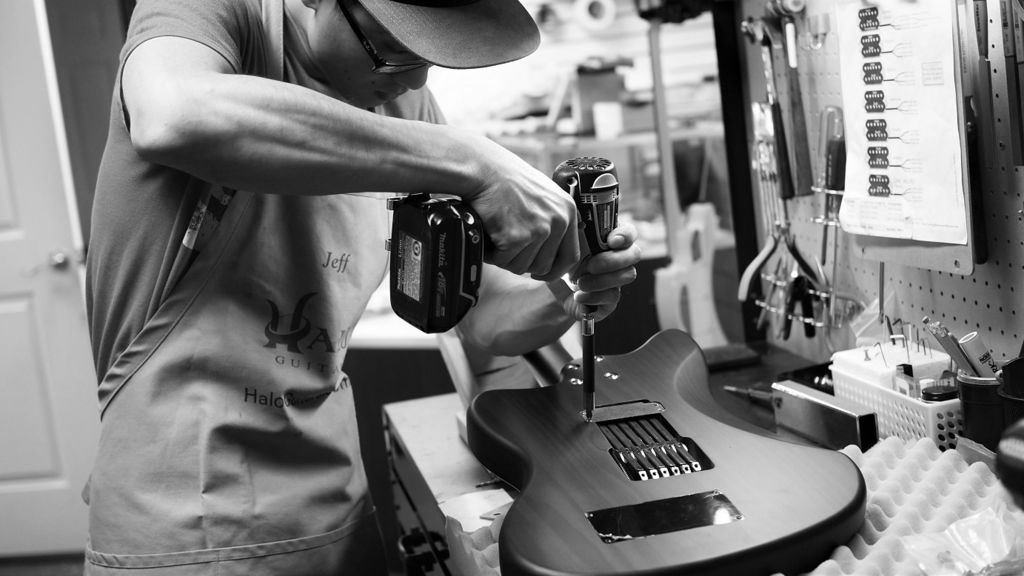
Joel: When did you decide you wanted to build guitars, and how did you go about learning?
Jeff: I made the decision to build custom guitars when I was an undergraduate student studying Business Administration at San Jose State University. Most of my classmates were setting themselves up for corporate jobs or grad school, but I was preparing myself to dive full time into the guitar business. I did most of my learning by doing... and by doing things very wrong. I also gained a lot of guitar-making wisdom from co-workers at Halo Custom Guitars, guitar building books and guitar forums.
Joel: I have to mention that your guitar/bass custom designing pages are quite possibly the most extensive and fully functional I've ever seen - even putting "big brand" companies' efforts to shame. How have you equipped yourself to handle such a wide range of requests?
Jeff: Thank you! It's really about having the right people first. The right people are experts at their stuff and have a can-do attitude. From there, it's all about equipping these people with the appropriate tools, machines, information, and instructions they need to get the job done. In short, we had to be able to build everything from scratch under our own roof. Depending on 3rd party vendors or pre-made templates would be too limiting. So, we got some land and built a little guitar factory on it, which we then stocked with all the old school woodworking tools, CNC machinery, raw materials, and other guitar components we needed.
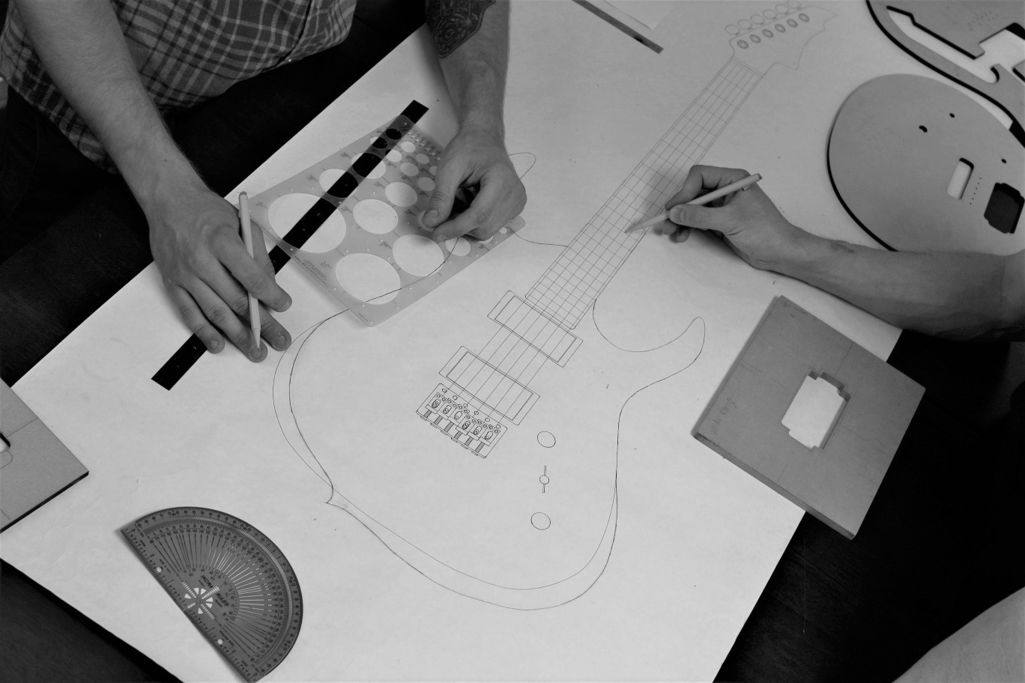
Joel: I don't want to pigeonhole your company into a single category, but I'm assuming you're into metal since I'm seeing 8, 9, and 10 string guitars - baritones as well. What would you say to someone having a hard time deciding between an 8 string guitar or a baritone scale 7 string?
Jeff: I'm definitely into metal, but I'm also fond of most other musical genres as well. My recommendation to someone deciding between an 8-string guitar and a baritone 7-string guitar is to first consider whether he/she would actually play all 8 strings or not. If yes, then the 7-string guitar isn't really a choice, so buy the 8-stringer. But if the player just wants to hit a Low F# note and largely disregard the higher notes, then I'd say get the 7-stringer and tune it accordingly. Continuing with this logic, it might even be best to get a baritone 6-stringer and tune it down accordingly.
Joel: Looking over your body shape selection, I'm seeing a soft spot for teles, 335s, and various semi-hollow bodied models - would you say you have any body styles that you're fond of?
Jeff: I do have a soft spot for Tele shapes and 335 shapes. I particularly like the Tele shape for playing while sitting because the neck is situated at a height that is really comfortable for me. I might also be drawn to the Tele shape because I'm a big fan of Brad Paisely's playing. I love the 335 shape, but the body is a bit wide for my liking. To help alleviate that "issue," I helped design a narrower version of it for Halo and it is called the DLH. I'm almost certain the reason why I'm drawn to the 335 shape is because my late father, Danny Lee, and I used to really "rock out" to Larry Carlton (Mr. 335) and he'd always be playing a 335. Oh, and the DLH stands for Danny Lee Halo.
Joel: Considering your massive selection of custom options, what's the strangest request you've received from a customer?
Jeff: Tough question because strange for me is not strange for others (especially the customer). I can't decide the strangest, so I'll just list 3 that come immediately to mind:
Bi-directional, double-neck 8-string guitar with detachable bodies, fully scalloped fretboards, Kahler tremolo systems, and active EMG pickups. This was built for Sonny Lombardozzi who is currently in the band Incantation.
31-Tone (62 microtonal frets!) 6-string baritone guitar with piezo pickups, MIDI output, P90's, Lace Alumitone single coil pickup, and split-able Lace Dually's. This was built for Stephen James Taylor who composes music professionally for film and TV.
Microtonal 10-string guitar with blood spatter custom graphics on the body. This was built for Kevin Sherwood who does the songwriting for the Call of Duty video games.
Joel: What would you say to someone looking to get into lutherie for the first time? Did you learn anything unexpected once you decided to pursue this path?
Jeff: I would say go for it. You'll find out pretty quickly if you love it or hate it. But, there are 4 things that I think greatly benefit one's success or failure in luthiery or guitar building. They are: (1) Fine motor skills. You gotta have them because there's just so much finesse work. (2) Patience. You gotta have it because there are so many time consuming and repetitive processes. (3) Love for the craft. If the roaring sound of routers and the sweet smell of sawdust doesn't draw you in, that's probably a bad sign. (4) Love for music. We are making musical instruments after all!
Joel: What sets your work apart from the larger instrument manufacturers (Ibanez, Fender, etc)?
Jeff: Larger guitar manufacturers fill a different need in the marketplace than smaller guitar companies. They operate on a much larger scale and therefore must design their guitars to meet the needs of a more general guitar-playing population, usually. They do this extremely well, by the way. But, for smaller guitar companies like Halo, it becomes possible to cater to each individual player's specific needs. There are lots of luthiers and guitar companies out there that are willing to build you anything you want. I think part of what sets Halo apart from the rest is what you've already mentioned... our guitar configurator and bass configurator tools on our website. To my knowledge, they are the most powerful guitar configurators on the web at the moment. We did some math a while back and found there to be more than 1 Octillion configurations that customers could potentially order and that we could actually build and deliver. Basically, we've made it possible for every guitar player in the world to design and see their dream guitar on our website and if they want to, they can even place an order and receive the real thing. I should mention the guitars are built to high-quality standards and are suitable for pro players.
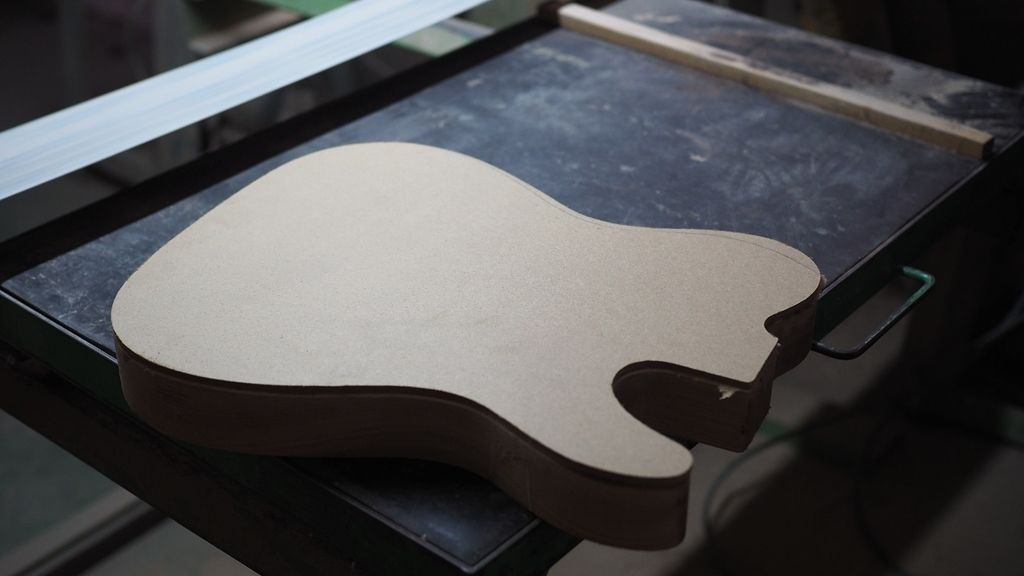
Joel: Since you're offering such a massive range of options, I have to wonder - what's your dream guitar? Have you built one for yourself?
Jeff: I do own a Halo guitar and play it often, but it wasn't made specially for me. It's just a 6-string baritone acoustic dreadnought that was supposed to be destroyed because we couldn't sell it (the neck was set into the body incorrectly). I am working on a Halo archtop guitar for myself currently. Halo has never built any archtop guitars before so this is new territory for me and the company. I think my dream guitar is the guitar I actually play, so that'd be my defective Halo 6-string baritone acoustic guitar. Hahaha...
Joel: Who or what would you say is your biggest inspiration when you set out to build a new instrument?
Jeff: I am most inspired by a custom guitar build that presents itself as a challenge in the sense that I'd have to learn something new, or apply something in a way I haven't done before. I find that I am most engaged and excited in these scenarios because it leads me to a deeper understanding and appreciation for the craft.

We'd like to thank Jeff Lee for taking the time to tell us about his craft, and encourage you all to check out their site - it's really fun!
Interview by Joel Bennett (read more stories) for Ultimate Guitar
Related Products
Leave a Reply
Your email address cannot be published. Required fields are marked*
Blog Search
Categories

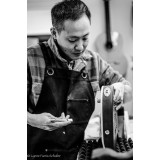
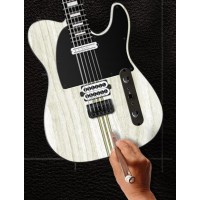
No comments